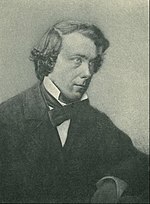Thomas Edward Brown, Date of Birth, Place of Birth, Date of Death
TweetThomas Edward Brown
Manx poet, scholar and theologian
 Date of Birth: 05-May-1830
Date of Birth: 05-May-1830
 Place of Birth: Douglas, United Kingdom
Place of Birth: Douglas, United Kingdom
Date of Death: 29-Oct-1897
Profession: poet
Zodiac Sign: Taurus 
About Thomas Edward Brown
- Thomas Edward Brown (5 May 1830 – 29 October 1897), commonly referred to as T.
- E.
- Brown, was a late-Victorian scholar, schoolmaster, poet, and theologian from the Isle of Man. Having achieved a double first at Christ Church, Oxford, and election as a fellow of Oriel in April 1854, Brown served first as headmaster of the Crypt School, Gloucester, then as a young master at the fledgling Clifton College, near Bristol (inspiring, among others, nascent poet W.E.
- Henley at Crypt School).
- Writing throughout his teaching career, Brown developed a poetry corpus—with Fo'c's'le Yarns (1881), The Doctor (1887), The Manx Witch (1889), and Old John (1893)—of narrative poetry in Anglo-Manx, the historic dialect of English spoken on the Isle of Man that incorporates elements of Manx Gaelic.
- It was Brown's role in creating the verse, with scholarly use of language shaping a distinct regional poetic form—featuring a fervour of patriotism and audacious and naturally pious philosophy of life unique to the islands, and interspersing pauses and irregularity of rhythm, an emotive admixture of mirth and sorrow, and a tenderness described by Quiller-Couch as rugged—that earned him the appellation of "Manx national poet." Retiring in 1892 to focus on writing, Brown died in 1897 (age 67), while again at the rostrum during a return visit to Clifton.
Read more at Wikipedia

